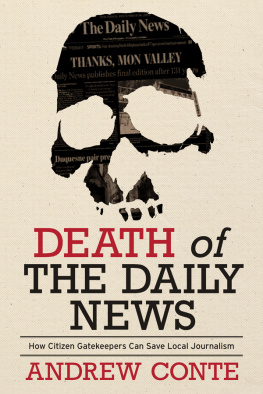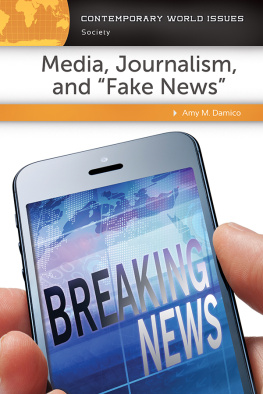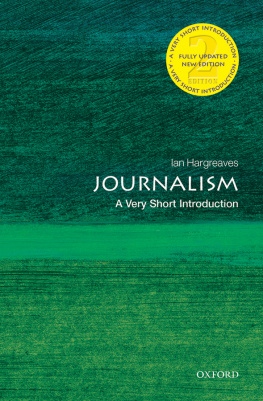
What's Fair?
Media Studies Series
Americas Schools and the Mass Media,
edited by Everette E. Dennis and Craig L. LaMay
Children and the Media,
edited by Everette E. Dennis and Edward C. Pease
Covering Congress,
edited by Everette E. Dennis and Robert W. Snyder
Covering the Courts,
edited by Robert Giles and Robert W. Snyder
The Culture of Crime,
edited by Everette E. Dennis and Craig L. LaMay
Defining Moments in Journalism,
edited by Nancy J. Woodhull and Robert W. Snyder
Higher Education in the Information Age,
edited by Everette E. Dennis and Craig L. LaMay
Journalists in Peril,
edited by Nancy J. Woodhull and Robert W. Snyder
The Media in Black and White,
edited by Everette E. Dennis and Edward C. Pease
Media and Democracy,
edited by Everette E. Dennis and Robert W. Snyder
Media Mergers,
edited by Nancy J. Woodhull and Robert W. Snyder
Media and Public Life,
edited by Everette E. Dennis and Edward C. Pease
Publishing Books,
edited by Everette E. Dennis, Craig L. LaMay, and Edward C. Pease
RadioThe Forgotten Medium,
edited by Edward C. Pease and Everette E. Dennis
Whats Fair? The Problem of Equity in Journalism
edited by Robert Giles and Robert Snyder
Originally published in the Media Studies Journal, Winter 1998.
Published 2000 by Transaction Publishers Published 2017 by Routledge
Published 2017 by Routledge
2 Park Square, Milton Park, Abingdon, Oxon, OX14 4RN
711 ThirdAvenue, New York, NY 10017, USA
Routledge is an imprint of the Taylor & Francis Group, an informa business
Copyright 2000 by Taylor & Francis.
Copyright 1999 by The Freedom Forum Media Studies Center and The Freedom Forum.
All rights reserved. No part of this book may be reprinted or reproduced or utilised in any form or by any electronic, mechanical, or other means, now known or hereafter invented, including photocopying and recording, or in any information storage or retrieval system, without permission in writing from the publishers.
Notice:
Product or corporate names may be trademarks or registered trademarks, and are used only for identification and explanation without intent to infringe.
Library of Congress Catalog Number: 99- 11505
Library of Congress Cataloging-in-Publication Data
Whats fair? : the problem of equity in journalism / edited by Robert Giles and Robert Snyder.
p. cm. (Media studies series)
Originally published in the Media studies journal, winter 1998.
Includes bibliographical references and index.
ISBN 0-7658-0616-9 (alk. paper)
1. Journalistic ethics. 2. Press and politics. 3. Freedom of the press. I. Giles, Robert H., 1933- . II. Snyder, Robert W., 1955- . III. Series.
PN4756.W53 1999
174'.9097dc21
99-11505
CIP
ISBN 13: 978-0-7658-0616-1 (pbk)
Whats fair? Its an old question in journalism, but in 1998 it seems more difficult to answer than ever. The cycle of story, spin and counterspin that surrounds the White House is only the most obvious part of the problem.
In the past twenty-five years or so, as communications scholar Daniel Hallin reminds us, the practice of journalism has changed enormously particularly in the United States. The demarcation of public and private life that once ruled certain kinds of stories out of bounds has eroded, leaving reporters with the unenviable challenge of having to cover events whose seaminess inevitably taints all who touch them. Old certainties that gave credibility to journalists, such as trust in government sources, have broken downweakening the authority of journalists as well. Commercial pressures, and a tidal wave of information and entertainment media, have engulfed the news businessleaving the definitions of journalism and journalistic standards vague and uncertain. And the technology of news reporting is speeding up news cycles in ways that leave little time for sober and measured judgments.
We dont pretend to have all the answers on whats fair in journalism. But we do believe that this issue of the Journal can advance a conversation that will take us closer to establishing a better understanding of what fairness in journalism means in theory and in practice.
Too many discussions of fairness are either numbingly abstract or impossibly righteous. To avoid those hazards, we have grounded this issue in storiesthe kind of stories journalists tell each other and the kind of stories people tell about journalism. We hope that these will spark compelling questions and ideas that will generate an energetic conversation about journalism and its place in our time.
In part 1, FairnessA Struggle, journalists explore a subject that they normally share only with close friends and colleaguestheir own efforts to be fair, including their failures. Where in Gods name do I begin? asks Thomas Winship, former editor of The Boston Globe.
To ask a former newspaper editor to fess up and re-examine acts of unfairness during his years on the clock is both therapeutic and humiliating. And edifying. In exploring struggles with fairness that occurred in places as different as South Africa, Washington and the South Bronx, our contributors share what they learned in meditating on issues of fairness in their own work. They have much to teach us.
If journalists and people who care about journalism are confused about the question of fairness, we can get oriented by taking a look backward to see how we got where we are today. In part 2, Fairness A History, nine contributors examine the history of the fairness question. Todays journalistic fairness in the United States is a blend of high hopes, historic traditions, contemporary political culture and the expediencies journalists face in keeping audiences, owners and sources at bay, writes Michael Schudson, an analyst of media history. It is a shifting set of principles and practices that will be tested and reformulated by a changing informational environment whose shape will not hold still. The section includes a collection of essays analyzing a notable effort to establish a set of guiding principles for the American mediathe Hutchins Commission report of 1947, which is evaluated here by a historian, a journalist and a First Amendment authority. In a comparative vein, two authorities on international communications law examine British regulations for fairness in broadcasting at the end of the 20th century.
In part 3, FairnessA Goal, our contributors explore what struggles for fairness mean in a variety of contexts, from American newsrooms to post-Communist Poland to Northern Ireland. Adam Michnik of Poland, who has made the journey from dissident essayist to above-ground newspaper editor, admonishes his fellow journalists: Struggle with your pen, but struggle in a decent way, without hatred. Do not hit more than is needed. Do not think you have a prescription for being just.
In closing, in our book review essay, ethicist Donald Shriver reviews four works on journalism ethics. He concludes that journalism, religion and media ethics, in their efforts to make sense of events and distinguish events of greater and lesser importance, all have much in common. Reason meets religionand journalism, Shriver writes, at the place where some ultimate concern, in theologian Paul Tillichs phrase, searches the sky for a north star.





